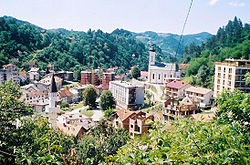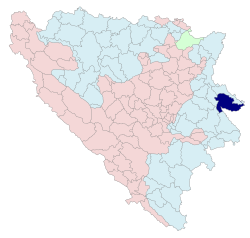Srebrenica
| Srebrenica | ||
|---|---|---|
 |
||
|
||
 Location of Srebrenica within Bosnia and Herzegovina |
||
| Country | Bosnia and Herzegovina | |
| Entity | Republika Srpska | |
| Boroughs | 81 | |
| Government | ||
| • Mayor | Mladen Grujičić | |
| Area | ||
| • Total | 526.83 km2 (203.41 sq mi) | |
| Population (2013 census) | ||
| • Total | 15,242 | |
| • Density | 28.9/km2 (75/sq mi) | |
| Time zone | CET (UTC+1) | |
| • Summer (DST) | CEST (UTC+2) | |
| Area code(s) | 56 | |
| Website | www.srebrenica.gov.ba | |
Srebrenica (Cyrillic: Сребреница, pronounced [srêbrenitsa]) is a town in the easternmost Republika Srpska, Bosnia and Herzegovina. Srebrenica is a small mountain town, its main industry being salt mining and a nearby spa.
During the Bosnian War, the town was the site of a July 1995 massacre of the town's Bosniak population, determined to have been a crime of genocide.
On 24 March 2007, Srebrenica's municipal assembly adopted a resolution demanding independence from the Republika Srpska entity (although not from Bosnia's sovereignty); the Serb members of the assembly did not vote on the resolution.
The municipality (општина or opština) is further subdivided into the following local communities (мјесне заједнице or mjesne zajednice):
The borders of the municipality in the 1953 and 1961 census were different. In 1953, Muslims by nationality had been yet to emerge as an ethnicity leading Slavic Muslims to identify as Yugoslavs. As Yugoslav was itself not adopted in 1948, they were all classified as other. In 2003, Bosnian Serbs comprised 95% of the population of Srebrenica.
Before 1992, there was a metal factory in the town, and lead, zinc, and gold mines nearby. The town's name (Srebrenica) means "silver mine", the same meaning of its old Latin name Argentaria.
Before the war, Srebrenica also had a big spa and the town prospered from tourism. Nowadays, Srebrenica has some tourism but a lot less developed than before the war. Currently, a pension, motel and a hostel are operating in the town.
...
Wikipedia

